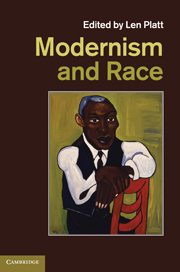Book contents
- Frontmatter
- Contents
- Notes on contributors
- Introduction
- 1 Germanism, the modern and ‘England’ – 1880–1930: a literary overview
- 2 ‘All these fellows are ourselves’: Ford Madox Ford, race and Europe
- 3 ‘’Tis optophone which ontophanes': race, the modern and Irish revivalism
- 4 Generating modernism and New Criticism from antisemitism: Laura Riding and Robert Graves read T. S. Eliot's early poetry
- 5 Race, modernism and the question of late style in Kipling's racial narratives
- 6 Atlantic modernism at the crossing: the migrant labours of Hurston, McKay and the diasporic text
- 7 Claude McKay in Britain: race, sexuality and poetry
- 8 Wyndham Lewis and the modernists: internationalism and race
- 9 ‘Until Hanandhunigan's extermination’: Joyce, China and racialised world histories
- 10 Race, gender and the Holocaust: traumatic modernity, traumatic modernism
- Index
- References
10 - Race, gender and the Holocaust: traumatic modernity, traumatic modernism
Published online by Cambridge University Press: 03 May 2011
- Frontmatter
- Contents
- Notes on contributors
- Introduction
- 1 Germanism, the modern and ‘England’ – 1880–1930: a literary overview
- 2 ‘All these fellows are ourselves’: Ford Madox Ford, race and Europe
- 3 ‘’Tis optophone which ontophanes': race, the modern and Irish revivalism
- 4 Generating modernism and New Criticism from antisemitism: Laura Riding and Robert Graves read T. S. Eliot's early poetry
- 5 Race, modernism and the question of late style in Kipling's racial narratives
- 6 Atlantic modernism at the crossing: the migrant labours of Hurston, McKay and the diasporic text
- 7 Claude McKay in Britain: race, sexuality and poetry
- 8 Wyndham Lewis and the modernists: internationalism and race
- 9 ‘Until Hanandhunigan's extermination’: Joyce, China and racialised world histories
- 10 Race, gender and the Holocaust: traumatic modernity, traumatic modernism
- Index
- References
Summary
A telling sign of the unfinished business of race in literary and cultural studies is a recent issue of Publications of the Modern Language Association of America (PMLA) devoted to the topic of ‘Comparative Racialization’. Reflecting global interest, scholars working on many cultures, including Asian, Latin and North American and Islamic, ponder the cultural and ideological constructions of race from the Middle Ages through today. In relation to modernity and modern thought, postcolonialism appears throughout the issue as the defining theory of race, accorded the intellectual authority to critique European philosophies such as Enlightenment thought and American pragmatism and neoliberalism. Racialised spheres of experience vary from American slavery, apartheid, creolised identities, and racial and ethnic passing to Henry Louis Gates's insistence that biology matters. With similar breadth and academic clout, recent studies of modernism stress the global reach of racial ideologies and practices through theories of the transnational. The ‘transnational’ replaces the fixed concepts and geopolitical boundaries signified by the term ‘international’ with new attention to modernist cultural production that not only represents artists around the world but also illuminates collective artistic movements and relationships across temporal and spatial borders. The sense of cultural fluidity reflected in contemporary race and modernist theories invites us to view race as a universal phenomenon in which moral, psychological and political economies may vary geographically and temporally but which involve similar forms of oppression and suffering.
- Type
- Chapter
- Information
- Modernism and Race , pp. 192 - 211Publisher: Cambridge University PressPrint publication year: 2011
References
- 1
- Cited by



